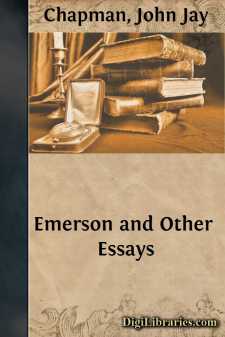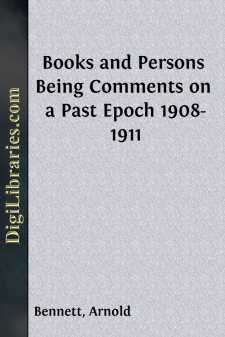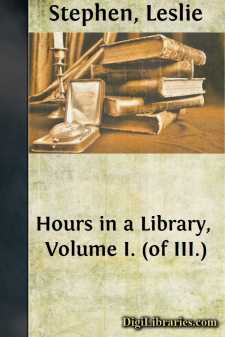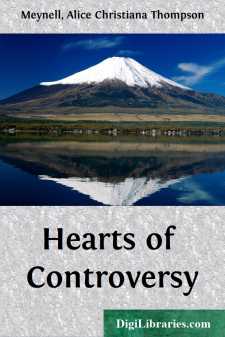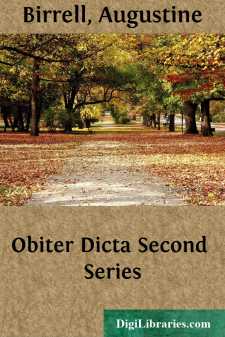Literary Criticism
- American 18
- Ancient and Classical 3
- Asian 1
- Australian & Oceanian 1
- Books & Reading 8
- Caribbean & Latin American 2
- Drama 2
- English, Irish, Scottish, Welsh 49
- European 7
- General 37
- Horror 1
- Humor 2
- Jewish 2
- Medieval 2
- Middle Eastern 3
- Poetry 7
- Renaissance 6
- Russian & Former Soviet Union 1
- Shakespeare 27
Literary Criticism Books
Sort by:
by:
John Jay Chapman
EMERSON I "Leave this hypocritical prating about the masses. Masses are rude, lame, unmade, pernicious in their demands and influence, and need not to be flattered, but to be schooled. I wish not to concede anything to them, but to tame, drill, divide, and break them up, and draw individuals out of them. The worst of charity is that the lives you are asked to preserve are not worth preserving....
more...
by:
Lady Gregory
RAFTERY I. One winter afternoon as I sat by the fire in a ward of Gort Workhouse, I listened to two old women arguing about the merits of two rival poets they had seen and heard in their childhood. One old woman, who was from Kilchreest, said: 'Raftery hadn't a stim of sight; and he travelled the whole nation; and he was the best poet that ever was, and the best fiddler. It was always at my...
more...
by:
Edmund Gosse
PREFACE: ON FLUCTUATIONS OF TASTE When Voltaire sat down to write a book on Epic Poetry, he dedicated his first chapter to "Differences of Taste in Nations." A critic of to-day might well find it necessary, on the threshold of a general inquiry, to expatiate on "Differences of Taste in Generations." Changes of standard in the arts are always taking place, but it is only with advancing...
more...
by:
Walter Crane
WALTER CRANE 1893 See handwritten text Mr Dallas's reproductions of my pen drawings for this work appear to me to be very faithful & successful in preserving the touch & general character of the originals. I have to certify that I have printed 650 copies of each of these eight subjects designed by Walter Crane, and engraved in Dallastype Facsimile by myself. Six Hundred Copies are for...
more...
by:
Arnold Bennett
WILFRED WHITTEN'S PROSE 4 Apr. '08 An important book on an important town is to be issued by Messrs. Methuen. The town is London, and the author Mr. Wilfred Whitten, known to journalism as John o' London. Considering that he comes from Newcastle-on-Tyne (or thereabouts), his pseudonym seems to stretch a point. However, Mr. Whitten is now acknowledged as one of the foremost experts in...
more...
by:
Leslie Stephen
OPINIONS OF AUTHORS Libraries are as the shrines where all the relics of the ancient saints, full of true virtue, and that without delusion or imposture, are preserved and reposed.—Bacon, Advancement of Learning. We visit at the shrine, drink in some measure of the inspiration, and cannot easily breathe in other air less pure, accustomed to immortal fruits.—Hazlitt's Plain Speaker. What a...
more...
SOME THOUGHTS OF A READER OF TENNYSON Fifty years after Tennyson’s birth he was saluted a great poet by that unanimous acclamation which includes mere clamour. Fifty further years, and his centenary was marked by a new detraction. It is sometimes difficult to distinguish the obscure but not unmajestic law of change from the sorry custom of reaction. Change hastes not and rests not, reaction...
more...
As was explained in the Note to the Preface of the previous editions and impressions of this book, after the first, hardly one of them appeared without careful revision, and the insertion of a more or less considerable number of additions and corrections. I found, indeed, few errors of a kind that need have seemed serious except to Momus or Zoilus. But in the enormous number of statements of fact which...
more...
I am sorry not to have been able to persuade my old friend, George Radford, who wrote the paper on ‘Falstaff’ in the former volume, to contribute anything to the second series of Obiter Dicta. In order to enjoy the pleasure of reading your own books over and over again, it is essential that they should be written either wholly or in part by somebody else. Critics will probably be found ready to...
more...
by:
John Masefield
CHAPTER I THE LIFE OF SHAKESPEARE Stratford-on-Avon is cleaner, better paved, and perhaps more populous than it was in Shakespeare's time. Several streets of mean red-brick houses have been built during the last half century. Hotels, tea rooms, refreshment rooms, and the shops where the tripper may buy things to remind him that he has been where greatness lived, give the place an air at once...
more...


